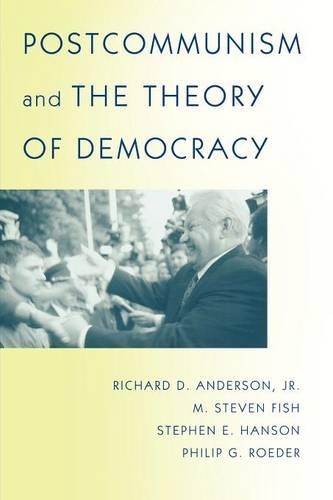
Postcommunism and the Theory of Democracy
(Paperback)
Publishing Details
Postcommunism and the Theory of Democracy
By (Author) Richard D. Anderson
By (author) M. Steven Fish
By (author) Stephen E. Hanson
By (author) Philip G. Roeder
Princeton University Press
Princeton University Press
11th February 2002
United States
Classifications
Professional and Scholarly
Non Fiction
Political structures / systems: democracy
321.8
Physical Properties
Paperback
216
Width 152mm, Height 235mm
28g
Description
Why did the wave of democracy that swept the former Soviet Union and Eastern Europe starting more than a decade ago develop in ways unexpected by observers who relied on existing theories of democracy In Postcommunism and the Theory of Democracy, four distinguished scholars conduct the first major assessment of democratization theory in light of the experience of postcommunist states. Richard Anderson, Steven Fish, Stephen Hanson, and Philip Roeder not only apply theory to practice, but using a wealth of empirical evidence, draw together the elements of existing theory into new syntheses. The authors each highlight a development in postcommunist societies that reveals an anomaly or lacuna in existing theory. They explain why authoritarian leaders abandon authoritarianism, why democratization sometimes reverses course, how subjects become citizens by beginning to take sides in politics, how rulers become politicians by beginning to seek popular support and not least, how democracy becomes consolidated. Rather than converging on a single approach, each author shows how either a rationalist, institutionalist, discursive, or Weberian approach sheds light on this transformation. They conclude that the experience of postcommunist democracy demands a rethinking of existing theory. To that end, they offer rich new insights to scholars, advanced students, policymakers, and anyone interested in postcommunist states or in comparative democratization.
Reviews
"This work will be central to anyone studying the region and democratization in general."--Choice
Author Bio
Richard D. Anderson, Jr., is Associate Professor of Political Science at the University of California, Los Angeles, where he is also active in Communication Studies. He is the author of Public Politics in an Authoritarian State: Making Foreign Policy in the Brezhnev Years. M. Steven Fish is Associate Professor of Political Science at the University of California, Berkeley. He is the author of Democracy from Scratch: Opposition and Regime in the New Russian Revolution (Princeton). Stephen E. Hanson is Associate Professor of Political Science at the University of Washington and Director of the Russian, East European, and Central Asian Studies Program of the Jackson School of International Studies. He is the author of Time and Revolution: Marxism and the Design of Soviet Institutions and coeditor of Can Europe Work Germany and the Reconstruction of Postcommunist Societies. Philip G. Roeder is Associate Professor of Political Science at the University of California, San Diego. He is the author of Red Sunset: The Failure of Soviet Politics (Princeton).
